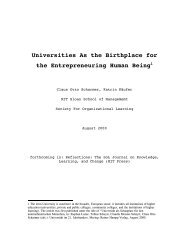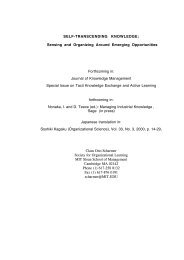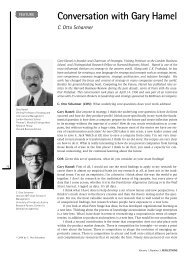Conversation with Charles Handy - Otto Scharmer
Conversation with Charles Handy - Otto Scharmer
Conversation with Charles Handy - Otto Scharmer
You also want an ePaper? Increase the reach of your titles
YUMPU automatically turns print PDFs into web optimized ePapers that Google loves.
<strong>Conversation</strong> <strong>with</strong> <strong>Charles</strong> <strong>Handy</strong> SCHARMERof cohesiveness and energy and excitement that you get from being small, but also wantingthe great benefits of being large. And really, it is this that drives my concept of federalismas being the appropriate business model and societal model. I do actually thinkthat federalism is a way of allowing small things to ride on the back of big things so thateverybody benefits. Federalism is a negotiated arrangement that is centralized, in somerespects, decentralized in other respects. It is both-and. In what respects it should be centralizedand in what respect it is decentralized has to be negotiated.COS: So you see federalism not only as a concept for organizing <strong>with</strong>in corporations butalso as a concept for organizing between corporations.<strong>Charles</strong> <strong>Handy</strong>: Oh, absolutely. Federalism basically arises because separate organizationswish to organize together. In order to get back to where they were or should havebeen, organizations have to dismantle themselves into federalism. And that proves verydifficult to do, because it is moving from monarchy or centralized rule to a much moredispersed system of power. And no monarch willingly gives away power.COS: Unless they are named Gorbachev.<strong>Charles</strong> <strong>Handy</strong>: Unless they are named Gorbachev, facing disintegration; or unless theyare, as Gorbachev would claim, visionary; or unless they are effectively about to fallapart anyway and clinging onto something. But the normal way the federations arise isthat small states come together and say, “We need each other.” And so, I really see federalismas the appropriate mechanism for small organizations to actually organize, asyou say, between organizations.COS: Couldn’t that be a confederation, rather than a federation?<strong>Charles</strong> <strong>Handy</strong>: A confederation is not enough in my view. A confederation is a voluntaryassociation <strong>with</strong> no center, so it has its uses, but it falls apart under any kind of attack.Federation is a system in which the individual states have actually granted certainpowers to the center.In a business situation, the ultimate power resides in these small organizations only ifthey have yielded power into the center. They don’t want to break away, because then theylose the advantages of bigness, but if the center is too overpowering, it pulls things toomuch. But yes, you’re absolutely right. The difference between a confederation and a federationis crucial, and I am not saying that confederations are much use; it is the federations.72COS: The concept of federalism has two main structural components. One is the verticaldimension, where the concept of subsidiarity is applied, and the other one is in that morehorizontal dimension, where you are arguing for a differentiation between different functions,like the legislative, the executive, and the judicial function. I would be particularlyinterested in the latter dimension, because it seems to me the most crucial one and it isnot really conceptualized in our current institutions.<strong>Charles</strong> <strong>Handy</strong>: Well, it is very important. Federalism is about a balance of power, always,between the center and the parts. And it is all about the parts giving authority tothe center to do things. Therefore, it is very important that you separate out these functions.For instance, the legislature—let’s call it, for businesses, the policy-making body—has to be done by a body that is representative of the parts. Of course, the actual policiesare drafted and put up, posed as possibilities by an executive, but in the end the decisionson policy have to be taken by a representative body. Now, that body is representativeof the member states, it is not representative of the shareholders. So, I am not talkingabout the board; the board is something else again.COS: That would essentially be a completely new institution.<strong>Charles</strong> <strong>Handy</strong>: Well, in some cases, it’s already there in a management team, if the man-Volume 1, Number 2, REFLECTIONS
















